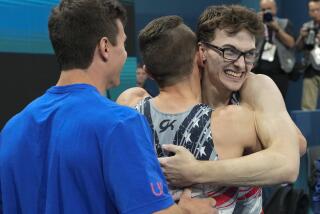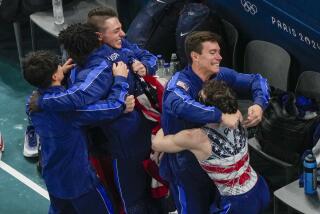U.S. OLYMPIC FESTIVAL: ORANGE COUNTY’S DAY : LOS ANGELES 1991 : Nordquist Remains Hopeful He Can Rise Above the Heat : Track: High jumper doesn’t win gold medal but survives temperature, which is a step toward preparing for ’92 Olympic Trials in New Orleans.
- Share via
LOS ANGELES — Doug Nordquist took another long chug-a-lug from his water jug, and smiled like a man who just outsmarted the enemy.
Nordquist, a 1984 Olympian from La Habra, didn’t win the high jump at the U.S. Olympic Festival’s track and field competition Sunday--he was second to longtime rival Leo Williams of Fresno--but he certainly had something to celebrate:
He didn’t have to be packed in ice that afternoon.
Nordquist, 31, has had his share of heat-related illnesses in recent months. While hot air may rise, it hasn’t done much to lift Nordquist over the high jump bar.
At The Athletics Congress national championships in June, Nordquist started feeling woozy midway through the competition. The temperature at the meet, held on Randalls Island, New York City, was in the 100s, and the humidity made the middle of the infield feel like hell on Earth.
Nordquist competed as best he could--he had hoped to be among the top three finishers to qualify for the World Championships in Tokyo--but his body wouldn’t cooperate.
He was diagnosed as having heat stroke and was packed in ice.
He returned to the East Coast this weekend, competing Saturday afternoon in the New York Games at Columbia University. Saturday morning, Nordquist said he was prepared for the heat, which was again in the 100s. He said he would sit in the steeplechase water pits and keep wet towels and plenty of fluids on hand. It didn’t work.
“I melted,” he said. “As the competition went on, I was so concerned with the heat.”
He jumped 7 feet 2 3/4 inches (his career best, set last year, is 7-8 3/4) and didn’t place in the top five. His reward? Another full-body ice pack, some cold compresses and a rest session in the shade.
Nordquist, a former standout at Sonora High School and Fullerton College, flew back to Los Angeles Saturday night, in time for the Festival competition Sunday afternoon. Fortunately for him, he was greeted with partly cloudy skies, cooler temperatures, and a small cheering section of family and friends.
But he wasn’t taking any chances with the weather. He took a swig from his water bottle every chance he got.
“I’ve probably drank five gallons of water in the last 24 hours,” he said.
Sunday’s competition came down to Nordquist and Williams battling for the gold medal. Both cleared 7-5 1/4, but Williams won the gold--his first in Festival competition--because he had fewer misses.
Nordquist, a two-time national champion, won the gold medal at the 1986 Festival, a silver in ’87 and a bronze last year. Williams had won a silver in ’81 and a bronze in ’82 and ’83.
But the two men, both 31, have even deeper ties. Nordquist was an up-and-coming high jumper at Washington State when Williams, the 1981 NCAA champion, was a standout for the Naval Academy.
“He owned me in college,” Nordquist said.
But at the 1984 U.S. Olympic Trials in Los Angeles, Nordquist entered the high jump competition as a relatively unknown but finished as the No. 2 qualifier behind Dwight Stones, his distant cousin. Nordquist managed that by improving his career best from 7-5 1/4 to 7-7 in one day.
Because of Nordquist’s whopping improvement, Williams was the odd man out. He finished fourth at the Trials (only three advance to the Olympics) and, having not beaten Nordquist again until Sunday, has harbored mock resentment ever since.
“I still think I owe Doug a favor from ‘84,” Williams said teasingly. “Of course, if I had a choice, I’d like to get him back in New Orleans (site of the 1992 Olympic Trials), not here.”
Nordquist will go to Europe next month to compete in international meets at Malmo, Sweden, and Zurich, Switzerland--sites where crowds are usually 10 times larger than Sunday’s estimated crowd of 4,000 in Drake Stadium at UCLA.
“It’s awesome, unbelievable,” said Nordquist of the European crowds. “It’s the kind of thing you have to experience to believe it.”
More to Read
Go beyond the scoreboard
Get the latest on L.A.'s teams in the daily Sports Report newsletter.
You may occasionally receive promotional content from the Los Angeles Times.







